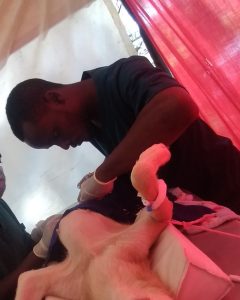Legend the bitch with pyometra
Introduction:
Pyometra, a condition characterized by the accumulation of pus within the uterus, poses a significant health risk to dogs and cats, particularly those receiving birth control pills. This ailment, while not exclusive to animals on hormonal contraceptives, often manifests as a complication of such medications. The administration of family planning pills, intended to prevent unwanted pregnancies, can inadvertently predispose these beloved pets to the development of pyometra and its associated complications. Understanding the dynamics of this condition and its relationship with contraceptive medications is paramount in safeguarding the health and well-being of our animal companions.
We take a case study of Legend, a 3-year-old female Maltese residing in Kira municipality, Uganda, presented with a series of distressing symptoms. Initially, her owners noticed a swelling in her abdomen resembling that of pregnancy, accompanied by a notable decrease in appetite. As time passed, Legend’s energy levels waned, and she became increasingly lethargic. Concerningly, she began passing black stool and pus from her anal opening, and her gait became unsteady, with difficulty maintaining balance while walking. Recognizing the severity of her condition, Legend’s owners promptly sought veterinary assistance.
Findings
Upon examination, Legend displayed signs of an enlarged uterus along with abdominal pain. Additionally, she exhibited fever and signs of dehydration. Laboratory analysis revealed evidence of a chronic bacterial infection, characterized by elevated levels of neutrophils and monocytes in her blood. Furthermore, her serum indicated the presence of liver disease, which had begun to affect the functioning of her liver, heart, and kidneys. Collectively, these findings indicated that Legend was suffering from an advanced stage of pyometra, a condition characterized by the presence of pus within the uterus.
Pathogenic bacteria often invade conditions such as hydrometra, mucometra, or endometrial hyperplasia, leading to the development of pyometra as a complication. Notably, administering certain medications, including family planning pills, to dogs can contribute, in part, to the development of these conditions.
In response to Legend’s diagnosis, she was initiated on a tailored treatment regimen. Subsequently, she underwent ovariohysterectomy surgery, during which her uterus and ovaries were surgically removed. The procedure revealed a significantly swollen and petrified uterus, and foul-smelling pus, highlighting the severity of her condition.
Following the surgery, Legend underwent a period of observation, during which her condition improved dramatically. All previously observed signs and symptoms resolved, and she regained her vitality. Today, Legend is living comfortably with her devoted owners, enjoying a renewed lease on life following her successful treatment.

Legend undergoing an ovariohysterectomy (removal of the ovaries and the uterus